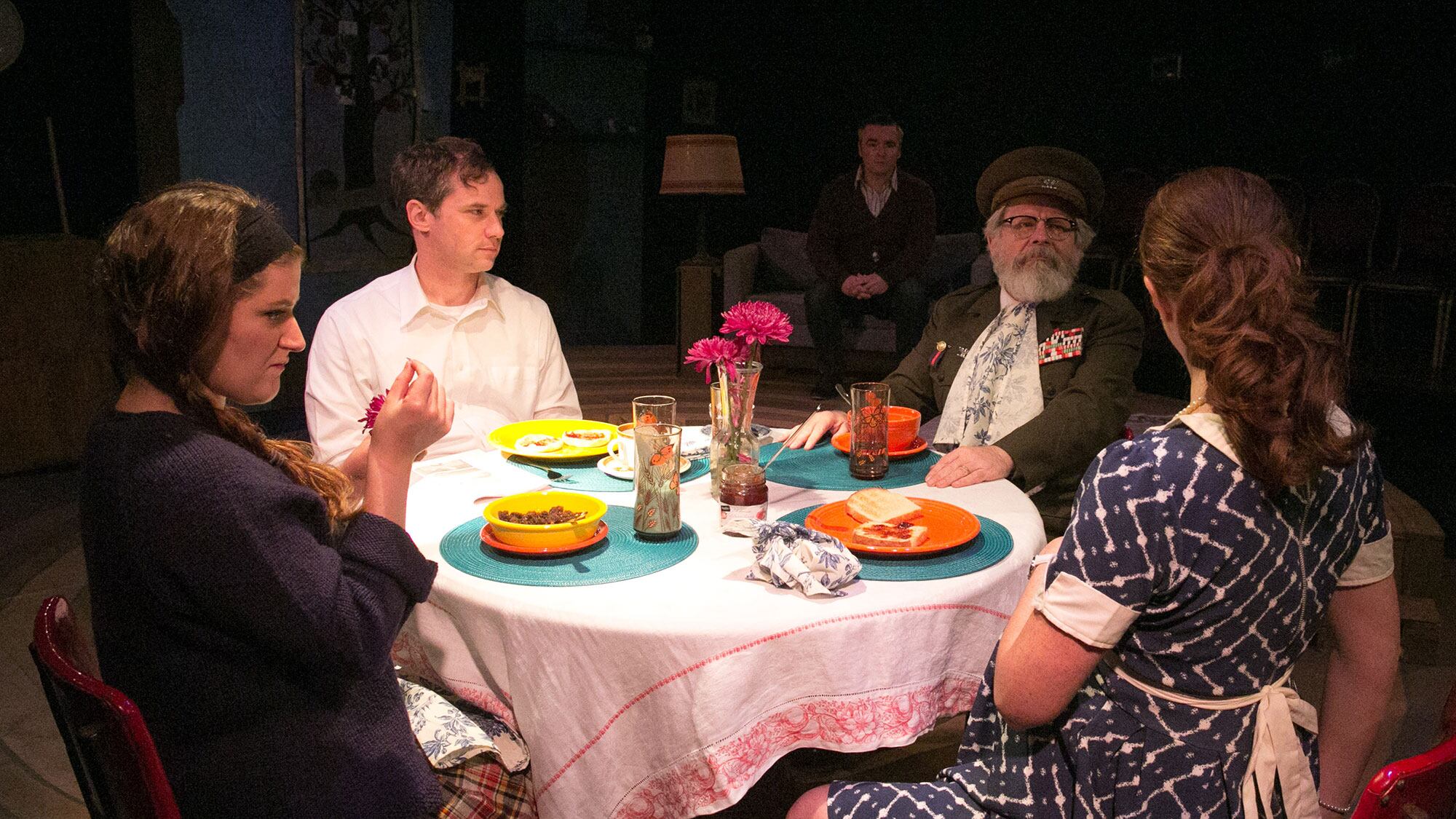In Noah Haidle's Smokefall, a woman asks her brother if he has ever seen the ocean. "On TV," he replies. "And in dreams." It's a sad and revealing answer. Smokefall is about a family for whom happiness is so elusive it may as well be a body of water they've witnessed only on a screen or imagined.
Cheeky, melodramatic and philosophical, Haidle's play is a multilayered portrait of misery and rebirth that isn't as revelatory as it wants to be. Yet thanks to a cast of emotionally fearless actors and sublime work by director Patrick Walsh and set designer Sophie Kristensen, Defunkt Theatre's production of Smokefall powers through the play's messiest passages to reach a cathartic and tender conclusion.
Smokefall is a tale told in three acts. The first (and best) unfolds mostly at the breakfast table as Violet (Brooke Calcagno), pregnant with twins, struggles to revitalize her fraying family: her depressed husband Daniel (Joe Von Appen), her mute-by-choice daughter Beauty (Jessica Hillenbrand), and her father (Chris Porter), who is always referred to as "the Colonel" and has fallen into the haze of memory loss.
A more conventional playwright might have followed these characters through lunch and dinner. Haidle takes a zanier route. Act 2 is set inside Violet's womb and Act 3 lurches decades into the future to catch up with Johnny (Porter), one of the twins. Disturbed by a fraught visit with his son (Matthew Kern), Johnny finds himself meditating on the questions that fascinate and disquiet Haidle: Can childhood traumas ever truly be transcended? Or are they lifelong shackles, never to be shed?
The first third of the production wrestles with those thoughts with comically horrifying bluntness. As Violet, Daniel, Beauty and the Colonel slog through their morning rituals, a commentator, appropriately named Footnote (Kern), serves up a series of disturbing asides. ("After this morning, Daniel will never see any of his family again," he informs us.) It's almost unbearable watching Violet meticulously care for the people she loves with the knowledge that, among other things, her husband and her daughter will forsake her, and her father will soon die.
If harsh honesty makes the play's first act mesmerizing, jumbled writing makes the second act baffling. The spectacle of the unborn twins having a highly sophisticated chat in the womb about everything from original sin to Raging Bull is cringingly cute and leads into the play's lowlight: a symbolic scene of self-harm that is offensively nonsensical. Haidle may have needed to make a point about the depths of the family's anguish, misappropriating a serious mental health issue to accomplish that goal felt unnecessary.
Haidle's stumbles contrast with the sureness of the performances, particularly Hillenbrand's—her quivering silence as Beauty is haunting and poignant—and Calcagno's, which turns Violet into a mask of cheer that just barely contains a torrent of weeping. It doesn't hurt that the actors get to play their scenes on Kristensen's gorgeous and ingenious set, which is emblazoned with images of tree rings—a visual representation of the layers of familial anguish that Johnny believes made it impossible for him to be happy. ("It was built inside of me to fail," he declares.)
Smokefall has been likened to Thornton Wilder's Our Town, a comparison that is not entirely apt—Wilder's blending of moods is as seamless as Haidle's is ungainly. Yet just as Violet's family finds bliss in the midst of their pain, Smokefall has passages that compensate for Haidle's worst impulses. In moments of precious intimacy—like when Beauty briefly breaks her vow of silence to say, "I love you too, Momma"—the play reminds you that even when you can't see the ocean, it exists.
SEE IT: Smokefall is at Defunkt Theatre, 4319 SE Hawthorne Blvd., defunktheatre.com. 7:30 pm Thursday-Saturday, 2 pm Sunday, through Nov. 16. Pay what you can.
